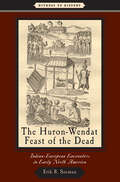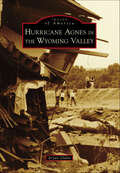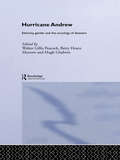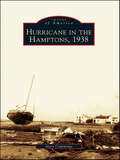- Table View
- List View
The Hurlers: The First All-Ireland Championship and the Making of Modern Hurling
by Paul RouseIn 1882, a letter was published in the Irish Times, lamenting the decline of hurling. The game was now played only in a few isolated rural pockets, and according to no fixed set of rules. It would have been absurd to imagine that, within five years, an all-Ireland hurling championship would be underway, under the auspices of a powerful national organization.The Hurlers is a superbly readable account of that dramatic turn of events, of the colourful men who made it happen, and of the political intrigues and violent rows that marked the early years of the GAA. From the very start, republican and ecclesiastical interests jockeyed for control, along with a small core of enthusiasts who were just in it for the sport. In this authoritative and seriously entertaning book, Paul Rouse shows how sport, culture and politics swirled together in a heady, often chaotic mix.'Fascinating ... a brilliantly researched book on hurling in the early years of the GAA' Martin Breheny, Irish Independent 'I heartily recommend it. Great picture of the emergence of modern Ireland amidst sport, nationalism, priests and assorted crazy hotheads ... Brilliant stuff' Dara Ó Briain 'A story of pioneerism, passion, intrigue, skulduggery and commitment ... a must read for the many sports, and particularly hurling, supporters and admirers in today's version of Ireland' Irish Times'Terrific' Kieran Shannon, Irish Examiner 'Brilliantly entertaining ... not just the gripping account of that first championship, but also of how the game of hurling itself was saved in the 1880s from what seemed certain extinction' Sunday Independent 'A brilliant piece of work' Matt Cooper'Both a sports and a history book, full of wonderful stories from a different time, with tales of passion, skullduggery and controversy, played out against the backdrop of what could be described as a civil war within the GAA and a land war that threatened to rip the country apart' RTÉ Culture 'Fascinating' Frank McNally, Irish Times'A page turner that continues to deliver chapter after chapter ... The Hurlers is a must read' Limerick Leader'A superbly readable account ... an authoritative and seriously entertaining book' Ireland's Own 'The perfect read for a brilliant hurling year' Caitriona Lally, Irish Independent Top Books of 2018'A vital look into the early years of the GAA and a perfect gift for both sport and history lovers' Mark Gallagher, Mail on Sunday Books of 2018'Marries forensic historical research of the cultural and political contexts for the emergence of modern hurling with a polished style and storytelling ability that is rare among historians' Diarmaid Ferriter, Irish Times Books of 2018'Flows along far more merrily and lightly than any history book has a right to and is especially enlightening when it comes to drawing the founding fathers Michael Cusack and Maurice Davin' Malachy Clerkin, Irish Times, Sports Books of 2018 'Marvellous ... the definitive account of this remarkable period when hurling came to life' Clonmel Nationalist'Brilliant' Kenny Archer, Irish News
Huron: The Seasons of a Great Lake
by Napier SheltonNapier Shelton takes us on a journey as he spends a year at his family's cottage on the lake. Having visited Lake Huron for over thirty years, Shelton weaves family memories into his evocative and informed account of the seasons on this great lake. In 1995, Shelton spent a year at the cottage more fully exploring Lake Huron and its varied shores. He writes about Native American fishing rights, small towns, the fearsome ice, and the migration of birds. He follows the seasonal changes of life in the water. We accompany him on commercial fishing boats, a research vessel studying lake trout, and a Coast Guard icebreaker. We experience the travels and tragedies of venturers on Lake Huron over the past four centuries.Huron is pleasurable reading for any student of natural history or the Great Lakes region, or for anyone who has ever spent time at a summer cottage or wished to do so.
The Huron Wendat Feast of the Dead: Indian European Encounters in Early North America (Witness to history)
by Erik R. SeemanErik R. Seeman analyzes these encounters, using the Feast of the Dead as a metaphor for broader Indian-European relations in North America. His compelling narrative gives undergraduate students of early America and the Atlantic World a revealing glimpse into this fascinating and surprising meeting of cultures.
The Huron-Wendat Feast of the Dead: Indian-European Encounters in Early North America (Witness to History)
by Erik R. Seeman"Two thousand Wendat (Huron) Indians stood on the edge of an enormous burial pit... they held in their arms the bones of roughly seven hundred deceased friends and family members. The Wendats had lovingly scraped and cleaned the bones of the corpses that had decomposed on the scaffolds. They awaited only the signal from the master of the ritual to place the bones in the pit. This was the great Feast of the Dead."Witnesses to these Wendat burial rituals were European colonists, French Jesuit missionaries in particular. Rather than being horrified by these unfamiliar native practices, Europeans recognized the parallels between them and their own understanding of death and human remains. Both groups believed that deceased souls traveled to the afterlife; both believed that elaborate mortuary rituals ensured the safe transit of the soul to the supernatural realm; and both believed in the power of human bones.Appreciating each other’s funerary practices allowed the Wendats and French colonists to find common ground where there seemingly would be none. Erik R. Seeman analyzes these encounters, using the Feast of the Dead as a metaphor for broader Indian-European relations in North America. His compelling narrative gives undergraduate students of early America and the Atlantic World a revealing glimpse into this fascinating—and surprising—meeting of cultures.
Hurricane: The Miraculous Journey of Rubin Carter
by James S. HirschIn 1967, the black boxer Rubin "Hurricane" Carter and a young acquaintance, John Artis, were wrongly convicted of triple murder by an all-white jury in Paterson, New Jersey. Over the next decade, Carter gradually amassed convincing evidence of his innocence and the vocal support of celebrities from Bob Dylan to Muhammad Ali. He was freed in 1976 pending a new trial, but he lost his appeal -- to the amazement of many -- and landed back in prison.Carter, bereft, shunned almost all human contact until he received a letter from Lesra Martin, a teenager raised in a Brooklyn ghetto. Against his bitter instincts, Carter agreed to meet with Martin, thus taking the first step on a tortuous path back to the world. Martin introduced him to an enigmatic group of Canadians who helped wage a successful battle to free him. As Carter orchestrated this effort from his cell, he also embarked on a singular intellectual journey, which led ultimately to a freedom more profound than any that could be granted by a legal authority.
The Hurricane (Routledge Revivals)
by Roger A PielkeFirst published in 1990, this book describes the nature of the hurricane, one of the world's most dangerous weather hazards. It examines the formation, development, movement, and impact of these tropical cyclones, and assess the ability of science to describe, forecast, and control them.
Hurricane Agnes in the Wyoming Valley (Images of America)
by Bryan GlahnAlthough history records the hurricane that struck northeastern Pennsylvania in June 1972 as "Agnes," residents of the Wyoming Valley affected by the storm and the resulting damage simply refer to it as "the flood." As the Susquehanna River rose to over 40 feet and left her banks, citizens could do nothing but watch as their lives were forever changed. A raging torrent unearthed dozens of previously resting bodies in the Forty Fort Cemetery, houses were knocked off their foundations or swept away entirely, and citizens took to their boats to rescue those who did not heed the warnings of the sirens that wailed when the waters began to surge through the city streets. And yet, amidst the drama, a wedding--scheduled long before the storm--proceeded, though not quite as envisioned by the bride and groom.
Hurricane Andrew: Ethnicity, Gender and the Sociology of Disasters
by Walter Gillis Peacock Betty Hearn Morrow Hugh GladwinThis book explores how social, economic and political factors set the stage for Hurricane Andrew by influencing who was prepared, who was hit the hardest, and who was most likely to recover. Employing unique research data the authors analyze the consequences of conflict and competition on disaster preparation, response and recovery, especially where associated with race, ethnicity and gender.
Hurricane Harvey's Aftermath: Place, Race, and Inequality in Disaster Recovery
by Kevin M. Fitzpatrick Matthew L. SpialekHeartbreaking stories from survivors along the Texas Gulf CoastHurricane Harvey was one of the worst American natural disasters in recorded history. It ravaged the Texas Gulf Coast, and left thousands of people homeless in its wake. In Hurricane Harvey’s Aftermath, Kevin M. Fitzpatrick and Matthew L. Spialek offer first-hand accounts from survivors themselves, providing a rare, on-the-ground perspective of natural disaster recovery. Drawing on interviews from more than 350 survivors, the authors trace the experiences of individuals and their communities, both rich and poor, urban and rural, white, Latinx, and Black, and how they navigated the long and difficult road to recovery after Hurricane Harvey. From Corpus Christi to Galveston, they paint a vivid, compelling picture of heartache and destruction, as well as resilience and recovery, as survivors slowly begin rebuilding their lives and their communities. An emotionally provocative read, Hurricane Harvey’s Aftermath provides insight into how ordinary people experience and persevere through a disaster in an age of environmental vulnerability.
Hurricane Hazel in the Carolinas
by Jay BarnesHurricane Hazel swept the U.S. Eastern Seaboard in mid-October 1954, eventually landing in the record books as one of the most deadly and enduring hurricanes. After punishing Haiti with mudslides that killed hundreds, Hazel edged northward, striking the Carolina coast as a ferocious category four. Landfall occurred near the South Carolina-North Carolina border, where a massive surge washed over barrier beaches and swept away hundreds of homes. Coastal communities like Myrtle Beach, Long Beach, Carolina Beach, and Wrightsville Beach caught the brunt of the storm tide and suffered heavy damages. Hazel barreled inland and battered eastern North Carolina with 100-plus mile-per-hour gusts that toppled trees and power lines and peeled away rooftops. It then raced northward setting new wind records across seven states. In Ontario, it spawned flash floods that became the most deadly in Canadian history. When it was all over, Hazel had killed more than 1,000 and left a trail of destruction across the hemisphere. But nowhere was its impact more dramatic than in the Carolinas.
Hurricane in the Hamptons, 1938
by Mary CummingsThe 1938 hurricane, the most severe and terrifying storm to hit Long Island in living memory, struck on September 21, a day that had dawned bright and fair in the seaside communities between Westhampton Beach and Montauk Point. Unaware of the storm whipping itself into a frenzy just miles away, village residents were going about their normal tasks when it struck, killing more than 30 and wreaking unprecedented destruction before nightfall. In Hurricane in the Hamptons, 1938, the story is told in more than 150 photographs, most of them taken by stunned residents in the immediate aftermath of the storm.
Hurricane Katrina in Transatlantic Perspective: Limits and Possibilities
by Randy J. Sparks Bruce Boyd Raeburn Richard Campanella Romain Huret James M. Boyden Thomas Adams"There is no such thing as a 'natural' disaster," writes Romain Huret in his introduction to this multidisciplinary study of the events surrounding and the legacy of Hurricane Katrina. Though nature produced Katrina's rising waters and destructive winds, a vast array of manmade factors shaped the scope of the storm's impact as well as the local and national response to it. In Hurricane Katrina in Transatlantic Perspective, American and European scholars approach this infamous storm and its aftermath through a variety of disciplines, from music to geography to anthropology, creating a nuanced understanding of how society reacts to and later remembers times of disaster.Richard Campanella and Romain Huret examine the particular geographical and political mix that set the stage for Katrina's devastation, especially among the poorest populations of New Orleans and the Gulf South. Jean Kempf, James Boyden, Andrew Diamond, and Thomas Jessen Adams address the ideological biases and racial stereotypes that infused local and national commentary in the days and weeks after the storm. Finally, Bruce Raeburn, Sara Le Menestrel, Anne M. Lovell, and Randy J. Sparks explore the impact of this powerful tropical event on the city's institutions and cultural organizations.Hurricane Katrina in Transatlantic Perspective offers a profound and innovative collection of insights on one of the most significant environmental catastrophes in U.S. history, forcing us to examine the cultural actors that transformed a natural disaster into a humanitarian crisis.
Hurricane Mitigation for the Built Environment
by Ricardo A. Alvarez"Alvarez drives home the point that for buildings and communities located in hurricane-prone regions, it is not a question of whether the area will be impacted, but when it will be impacted. The book makes a strong case for taking responsibility to understand the vulnerabilities of buildings and structures to hurricane impacts." Timothy Reinhold, P
Hurricane Sandy on New Jersey's Forgotten Shore
by Abigail PerkissHurricane Sandy on New Jersey's Forgotten Shore brings to life the individual and collective voices of a community: victims, volunteers, and state and federal agencies that came together to rebuild the Bayshore after the Superstorm Sandy in 2013. After the tumultuous night of October 29, 2012, the residents of Monmouth, Ocean, and Atlantic Counties faced an enormous and pressing question: What to do? The stories captured in this book encompass their answer to that question: the clean-up efforts, the work with governmental and non-governmental aid agencies, and the fraught choices concerning rebuilding. Through a rich and varied set of oral histories that provide perspective on disaster planning, response, and recovery in New Jersey, Abigail Perkiss captures the experience of these individuals caught in between short-term preparedness initiatives that municipal and state governments undertook and the long-term planning decisions that created the conditions for catastrophic property damage. Through these stories, Hurricane Sandy on New Jersey's Forgotten Shore lays bare the ways that climate change and sea level rise are creating critical vulnerabilities in the most densely populated areas in the nation, illuminating the human toll of disaster and the human capacity for resilience.
Hurt: Chronicles of the Drug War Generation
by Miriam BoeriHurt: Chronicles of the Drug War Generation weaves engaging first-person accounts of the lives of baby boomer drug users, including author Miriam Boeri’s first-hand knowledge as the sister of a heroin addict. The compelling stories are set in historical context, from the cultural influence of sex, drugs, and rock 'n' roll to contemporary discourse that pegs drug addiction as a disease punishable by incarceration. With penetrating insight and conscientious attention to the intersectionality of race, gender, and class, Boeri reveals the impact of an increasingly punitive War on Drugs on a hurting generation.
Hurting Yet Whole: Reconciling Body and Spirit in Chronic Pain and Illness
by Liuan HuskaWhat if the things we most fear about our bodies—our vulnerability to illness and pain—are exactly the places where God meets us most fully? As Liuan Huska went through years of chronic pain, she wondered why God seemed absent and questioned some of the common assumptions about healing. What do we do when our bodies don't work the way they should? What is healing, when one has a chronic illness? Can we still be whole when our bodies suffer? The Christian story speaks to our experiences of pain and illness. In the embodiment of Jesus' life, we see an embrace of the body and all of the discomfort and sufferings of being human. Countering a Gnosticism that pits body against spirit, Huska takes us on a journey of exploring how healing is not an escape from the limits of the body, but becoming whole as souls in bodies and bodies with souls. As chronic pain forces us to pay attention to our bodies' vulnerability, we come to embrace the fullness of our broken yet beautiful bodies. She helps us redefine what it means to find healing and wholeness even in the midst of ongoing pain.
Husband-coached Childbirth (fifth Edition): The Bradley Method Of Natural Childbirth
by Robert A. Bradley Marjie Hathaway Jay Hathaway James HathawayNow completely revised and updated for today's parents-to-be... The book that started a revolution in the birthing experience and helped millions of women and their partners to a safe and natural childbirth. The Bradley Method has changed the way men and women—and the medical establishment—think about childbirth today. Now this new, updated edition of the groundbreaking work by Robert A. Bradley, M.D., has all the information you need to approach a natural childbirth safely, confidently, and wisely. From the reasons to choose the Bradley Method to the steps you will take as your birth day approaches—and after the birth of your baby—this book is designed to help couples share completely in the birthing experience. •Build better, deeper, and more trusting communication skills with your partner in preparation for a drug-free childbirth •Learn the physical, emotional, and mental relaxation techniques essential to a natural childbirth •Discover how you and your doctor can work together toward your natural delivery •Monitor your weight, nutrition, and your overall well-being during pregnancy •Use natural prevention methods for the most common pregnancy problems •Get the most out of the bonding experience you will share with your baby and your partner With its time-tested wisdom, medical soundness, and reassuring first-person accounts of natural childbirth, this book is the “gold standard” of childbirth books. The Bradley Method is an essential guide for anyone considering childbirth without unnecessary medications or medical intervention and to share fully in your child’s arrival into the world.
The Husband Hunters: American Heiresses Who Married into the British Aristocracy
by Anne De CourcyA deliciously told group biography of the young, rich, American heiresses who married into the impoverished British aristocracy at the turn of the twentieth century – The real women who inspired Downton AbbeyTowards the end of the nineteenth century and for the first few years of the twentieth, a strange invasion took place in Britain. The citadel of power, privilege and breeding in which the titled, land-owning governing class had barricaded itself for so long was breached. The incomers were a group of young women who, fifty years earlier, would have been looked on as the alien denizens of another world - the New World, to be precise. From 1874 - the year that Jennie Jerome, the first known 'Dollar Princess', married Randolph Churchill - to 1905, dozens of young American heiresses married into the British peerage, bringing with them all the fabulous wealth, glamour and sophistication of the Gilded Age.Anne de Courcy sets the stories of these young women and their families in the context of their times. Based on extensive first-hand research, drawing on diaries, memoirs and letters, this richly entertaining group biography reveals what they thought of their new lives in England - and what England thought of them.
The Husband Hunters: Social Climbing in London and New York
by Anne de CourcyTowards the end of the nineteenth century and for the first few years of the twentieth, a strange invasion took place in Britain. The citadel of power, privilege and breeding in which the titled, land-owning governing class had barricaded itself for so long was breached. The incomers were a group of young women who, fifty years earlier, would have been looked on as the alien denizens of another world - the New World, to be precise. From 1874 - the year that Jennie Jerome, the first known 'Dollar Princess', married Randolph Churchill - to 1905, dozens of young American heiresses married into the British peerage, bringing with them all the fabulous wealth, glamour and sophistication of the Gilded Age.Anne de Courcy sets the stories of these young women and their families in the context of their times. Based on extensive first-hand research, drawing on diaries, memoirs and letters, this richly entertaining group biography reveals what they thought of their new lives in England - and what England thought of them.
The Husband Hunters: Social Climbing in London and New York
by Anne de CourcyTowards the end of the nineteenth century and for the first few years of the twentieth, a strange invasion took place in Britain. The citadel of power, privilege and breeding in which the titled, land-owning governing class had barricaded itself for so long was breached. The incomers were a group of young women who, fifty years earlier, would have been looked on as the alien denizens of another world - the New World, to be precise. From 1874 - the year that Jennie Jerome, the first known 'Dollar Princess', married Randolph Churchill - to 1905, dozens of young American heiresses married into the British peerage, bringing with them all the fabulous wealth, glamour and sophistication of the Gilded Age.Anne de Courcy sets the stories of these young women and their families in the context of their times. Based on extensive first-hand research, drawing on diaries, memoirs and letters, this richly entertaining group biography reveals what they thought of their new lives in England - and what England thought of them.
The Husband Hunters: Social Climbing in London and New York
by Anne de CourcyTowards the end of the nineteenth century and for the first few years of the twentieth, a strange invasion took place in Britain. The citadel of power, privilege and breeding in which the titled, land-owning governing class had barricaded itself for so long was breached. The incomers were a group of young women who, fifty years earlier, would have been looked on as the alien denizens of another world - the New World, to be precise. From 1874 - the year that Jennie Jerome, the first known 'Dollar Princess', married Randolph Churchill - to 1905, dozens of young American heiresses married into the British peerage, bringing with them all the fabulous wealth, glamour and sophistication of the Gilded Age.Anne de Courcy sets the stories of these young women and their families in the context of their times. Based on extensive first-hand research, drawing on diaries, memoirs and letters, this richly entertaining group biography reveals what they thought of their new lives in England - and what England thought of them.Read by Clare Corbett(p) Orion Publishing Group 2017
The Husband Poisoner: Suburban women who killed in post-World War II Sydney
by Tanya BrethertonShocking real-life stories of murderous women who used rat poison to rid themselves of husbands and other inconvenient family members. For readers of compelling history and true crime, from critically acclaimed, award-winning author Tanya Bretherton.After World War II, Sydney experienced a crime wave that was chillingly calculated. Discontent mixed with despair, greed with callous disregard. Women who had lost their wartime freedoms headed back into the kitchen with sinister intent and the household poison thallium, normally used to kill rats, was repurposed to kill husbands and other inconvenient family members. Yvonne Fletcher disposed of two husbands. Caroline Grills cheerfully poisoned her stepmother, a family friend, her brother and his wife. Unlike arsenic or cyanide, thallium is colourless, odourless and tasteless; victims were misdiagnosed as insane malingerers or ill due to other reasons. And once one death was attributed to natural causes, it was all too easy for an aggrieved woman to kill again.This is the story of a series of murders that struck at the very heart of domestic life. It's the tale of women who looked for deadly solutions to what they saw as impossible situations. The Husband Poisoner documents the reasons behind the choices these women made - and their terrible outcomes.
Husbands, Wives, and Concubines: Marriage, Family, and Social Order in Sixteenth-Century Verona (Sixteenth Century Essays & Studies #69)
by Emlyn EisenachEmlyn Eisenach uses a wide range of sources, including the richly detailed and previously unexplored records of nearly two hundred marriage-related disputes from the bishop’s court of Verona, to illuminate family and social relations in early modern northern Italy. Arguing against the common emphasis on the growth of law and government in this period, her study emphasizes the fluidity of the principles that governed marriage and its dissolution, and deepens our understanding of the patriarchal family and its complex relationship with gender and status during the sixteenth century.Peopled by characters from across the social spectrum of the city of Verona and its contado, Eisenach’s study moves between stories about specific individuals—serving girls seeking honorable marriage through the unlikely route of concubinage, peasant men in search of independence from their fathers, and aristocratic wives seeking revenge against adulterous husbands—and broader analyses of social, economic, and geographical patterns of behavior. She shows how the Veronese at all social levels attempted to better their familial and personal fortunes by creatively molding wedding rituals to fit their particular circumstances, or engaging in the significant but until now little understood practices of concubinage, clandestine marriage, or informal marriage dissolution.Eisenach also evaluates the first half-century of religious reforms in Verona as the leading pre-Tridentine bishop Gian Matteo Giberti and his successors challenged common practices and understandings in sermons, treatises, confessionals, and court. Emphasizing the limitations of what the religious authorities could impose on the people, she explores how learned and popular notions of marriage, family, and gender shaped each other as they were put into action in the strategies of individual Veronese.
Husbands, Wives, and Concubines: Marriage, Family, and Social Order in Sixteenth-Century Verona (Sixteenth Century Essays & Studies #69)
by Emlyn EisenachEmlyn Eisenach uses a wide range of sources, including the richly detailed and previously unexplored records of nearly two hundred marriage-related disputes from the bishop’s court of Verona, to illuminate family and social relations in early modern northern Italy. Arguing against the common emphasis on the growth of law and government in this period, her study emphasizes the fluidity of the principles that governed marriage and its dissolution, and deepens our understanding of the patriarchal family and its complex relationship with gender and status during the sixteenth century.Peopled by characters from across the social spectrum of the city of Verona and its contado, Eisenach’s study moves between stories about specific individuals—serving girls seeking honorable marriage through the unlikely route of concubinage, peasant men in search of independence from their fathers, and aristocratic wives seeking revenge against adulterous husbands—and broader analyses of social, economic, and geographical patterns of behavior. She shows how the Veronese at all social levels attempted to better their familial and personal fortunes by creatively molding wedding rituals to fit their particular circumstances, or engaging in the significant but until now little understood practices of concubinage, clandestine marriage, or informal marriage dissolution.Eisenach also evaluates the first half-century of religious reforms in Verona as the leading pre-Tridentine bishop Gian Matteo Giberti and his successors challenged common practices and understandings in sermons, treatises, confessionals, and court. Emphasizing the limitations of what the religious authorities could impose on the people, she explores how learned and popular notions of marriage, family, and gender shaped each other as they were put into action in the strategies of individual Veronese.
Hush: Media and Sonic Self-Control (Sign, Storage, Transmission)
by Mack HagoodFor almost sixty years, media technologies have promised users the ability to create sonic safe spaces for themselves—from bedside white noise machines to Beats by Dre's “Hear What You Want” ad campaign, in which Colin Kaepernick's headphones protect him from taunting crowds. In Hush, Mack Hagood draws evidence from noise-canceling headphones, tinnitus maskers, LPs that play ocean sounds, nature-sound mobile apps, and in-ear smart technologies to argue the true purpose of media is not information transmission, but rather the control of how we engage our environment. These devices, which Hagood calls orphic media, give users the freedom to remain unaffected in the changeable and distracting spaces of contemporary capitalism and reveal how racial, gendered, ableist, and class ideologies shape our desire to block unwanted sounds. In a noisy world of haters, trolls, and information overload, guarded listening can be a necessity for self-care, but Hagood argues our efforts to shield ourselves can also decrease our tolerance for sonic and social difference. Challenging our self-defeating attempts to be free of one another, he rethinks media theory, sound studies, and the very definition of media.






















